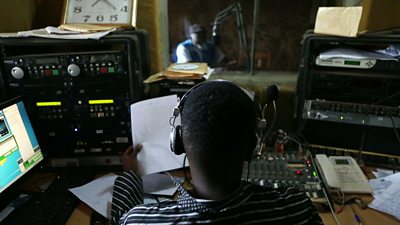Downloads
Publication date: February 2016
Summary
During the 2014/5 Ebola outbreak in Sierra Leone ±«Óãtv Media Action supported staff at 42 local or community-based radio stations to improve communication about the disease. Case studies indicate these stations were able to provide actionable information and contributed to changing listeners’ attitudes as well as providing a platform for people to interact with those involved in the response.
Context
Sierra Leone was initially declared Ebola free in November 2015. By then the 2014/5 outbreak had claimed the lives of 3,955 people in the country.
During the Ebola outbreak, ±«Óãtv Media Action worked closely with local radio stations as part of the Social Mobilisation Action Consortium (SMAC) to provide platforms for discussions and give listeners timely, relevant and practical information. The SMAC project began in October 2014, just before the outbreak reached its peak when there was still widespread misinformation about the disease.
±«Óãtv Media Action’s support to local stations involved training sessions, on-the-job mentoring and providing production equipment and financial support. This work was funded with UK aid from the UK government.
Research approach
Researchers conducted case studies at four partner stations: in Freetown, Kambia, Bo and Kailahun. They looked at how the stations were supporting their local communities during the outbreak, and how the partnership with ±«Óãtv Media Action supported the stations. Fieldwork took place in August 2015. In each location, focus group discussions were undertaken with listeners, and the station manager, a journalist and local stakeholders were interviewed.
Key findings
- Radio was seen as a key source of information during the outbreak, helping to raise awareness about the disease and reinforce behaviour change communication carried out by social mobilisers, health professionals and local leaders.
- Radio stations were seen to have helped to change attitudes among listeners at different points during the outbreak. Examples included helping to increase sympathy for and reduce fear of Ebola survivors and helping to reduce listeners’ fears about attending hospitals or treatment centres
- The stations provided a platform for those involved in the Ebola response locally to update their communities on the response. They also provided a channel for two-way communication with those involved in the Ebola response, as listeners could text or call in with questions.
- Examples were given of how local shows helped to promote accountability– audiences in one area mentioned that they could call into the station and highlight places which did not have hand-washing facilities.
- Mentoring helped stress to some journalists the importance of providing positive, actionable information to communities.
- Training and mentoring also helped journalists to produce engaging content about the disease – particularly later in the outbreak when listeners were felt to be tiring of hearing Ebola coverage.
- In some cases, the provision of equipment and training helped journalists’ to report safely from affected communities. Listeners highlighted this ‘on-the-scene’ reporting as helping to bolster the credibility of a station’s Ebola coverage.
Implications
When considering how to communicate in response to a crisis – particularly if the response has significant behaviour change communication challenges - responders should consider the potential role that local and community radio can play in producing content. Local radio stations are well placed to support these efforts in a number of ways:
- They are an established and often already well-trusted source of information for people in affected communities.
- They can broadcast in local languages or dialects. ±«Óãtv Media Action research indicates that 15% of rural audiences understand neither Krio nor English (national survey, 2015).
- Local stations can produce content which speaks directly to localised issues and concerns, and features trusted local figures – in a way that nationally or regionally produced content cannot.
